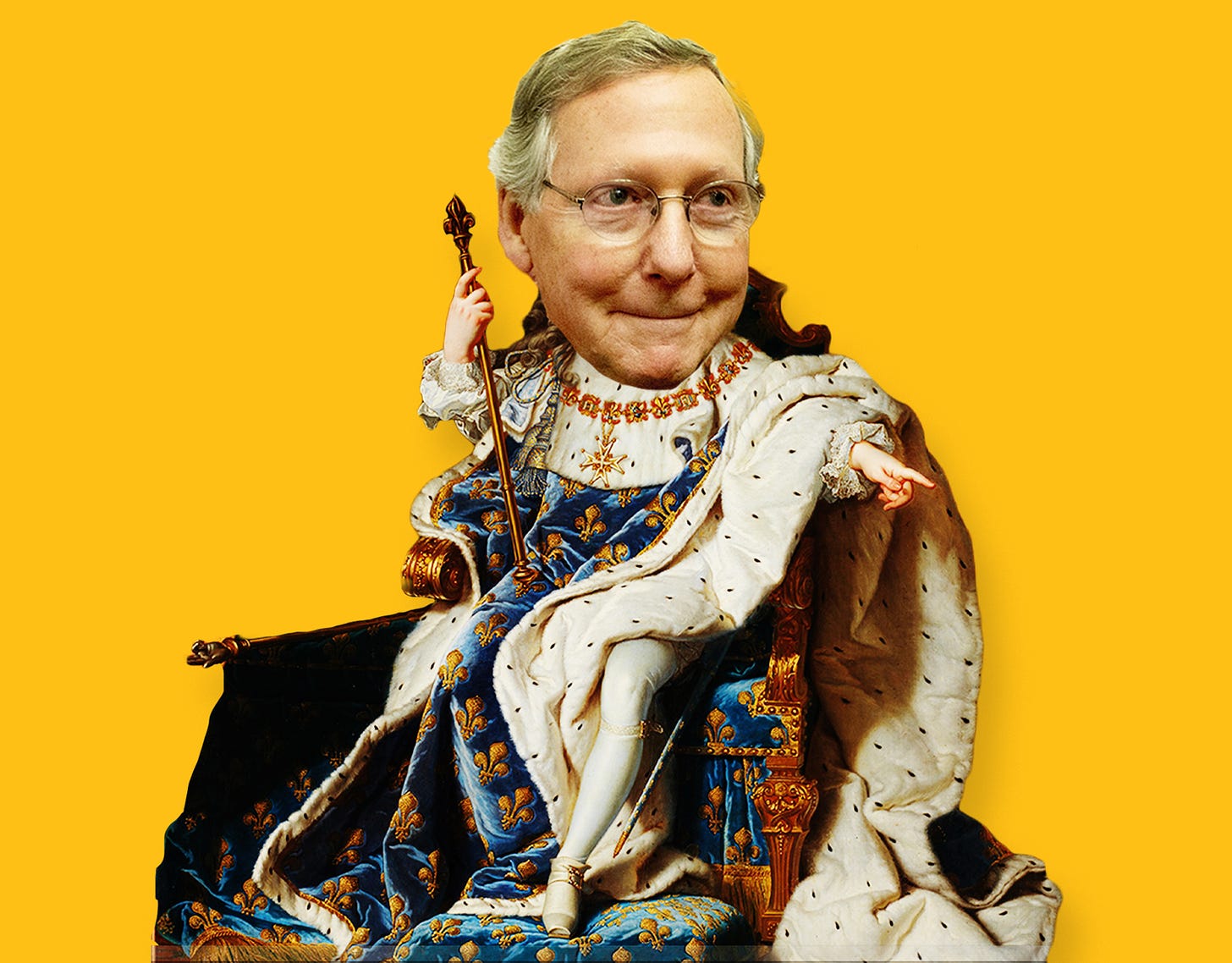How Mitch McConnell Made Himself King of the Senate
His powers don’t come from the Constitution. Or even any legislation.
Congress returns this week from its extended recess facing three different but equally massive tasks: It must fund the government by the end of the month; consider substantive legislation on a host of pressing issues, such as gun control and trade; and hold oversight (and maybe even impeachment) hearings on the lengthy menu of recklessness served up by the current president of the United States.
Meanwhile, populist sentiment continues to stoke anger and hatred among increasingly polarized voters who face a spectrum of daunting life challenges that the current government refuses to fix.
Voters are pointing fingers, variously, at House Democrats, Republican senators, federal agencies, the federal judiciary, their state and local counterparts, and of course Donald J. Trump himself. As we approach the November 2020 election, many people believe that the very future of democracy hangs in the balance.
Missing from this conversation is a very troubling constitutional anathema: Much of the logjam in government falls at the feet of a single man whose power does not stem from the Constitution at all. As Senate Majority Leader, Mitch McConnell has repeatedly and single-handedly flouted the will of the people and the prerogatives of his governmental counterparts otherwise mandated by the U.S. Constitution.
Here’s just a sampling: McConnell blocked legislation that would make Election Day a national holiday so that people could more easily participate in their democracy (calling the proposal a “Democratic power grab”); he blocked legislation that would address Russian interference in the 2016 election and shore up election security for 2020 (calling one bill to address Moscow’s nefariousness “highly partisan”); in the wake of multiple mass shootings, he held up Senate debate on reasonable gun legislation that would impose—at a minimum—background checks that nearly 90 percent of the U.S. population supports; and he has stymied legislation aimed at lowering the cost of prescription drugs and enhancing protections for people with pre-existing conditions.
None of this is new. Most infamously, McConnell blocked President Barack Obama’s express power under Article II of the Constitution to appoint Supreme Court justices with the advice and consent of the Senate. Nothing in the Constitution authorizes the Senate Majority Leader to thwart the president’s appointment power by refusing to trigger the advice and consent process in the first place (though neither does anything explicitly prevent McConnell from doing what he did).
Keep in mind that in a representative democracy of 327 million people, McConnell is a single senator from a single state. What this means is that a relative handful of Kentuckians hold the rest of America by the throat. This is not democracy.
The role of Senate Majority Leader is nowhere in the Constitution, which provides only that “[e]ach House may determine the Rules of its Proceedings.”
McConnell’s power is not set forth in a statute passed by both houses of Congress and signed into law by a president, either.
The power instead comes from rules of internal Senate procedure, which give McConnell the authority to raise measures for Senate floor consideration. The Senate website explains that the “standing rules” are merely “a body of precedents created by rulings of presiding officers or by votes of the Senate, a variety of established and customary practices, and ad hoc arrangements the Senate makes to meet specific parliamentary and political circumstances.”
Yet in the hands of an obstructionist-in-chief like McConnell, these “ad hoc arrangements” have functioned to override the constitutional prerogatives of a sitting president and the rest of Congress. In short, McConnell can stop any congressional action in its tracks by refusing to bring it to the Senate floor. In a country founded on the violent and sacrificial rejection of a monarchy, Mitch McConnell has crowned himself the King of the Senate.
This constitutional blind spot in government by “We the People” must be fixed. McConnell has way too much power, and as long as he remains at the helm, senators won’t even get the chance to consider rule changes that would enhance the voice of the people.
Kentucky voters: America needs your help.




